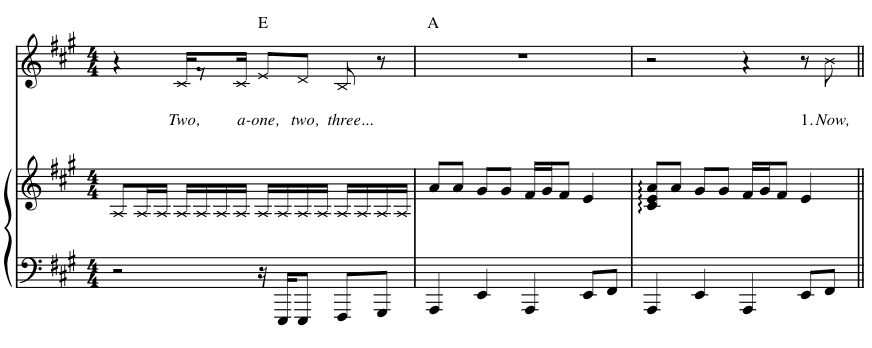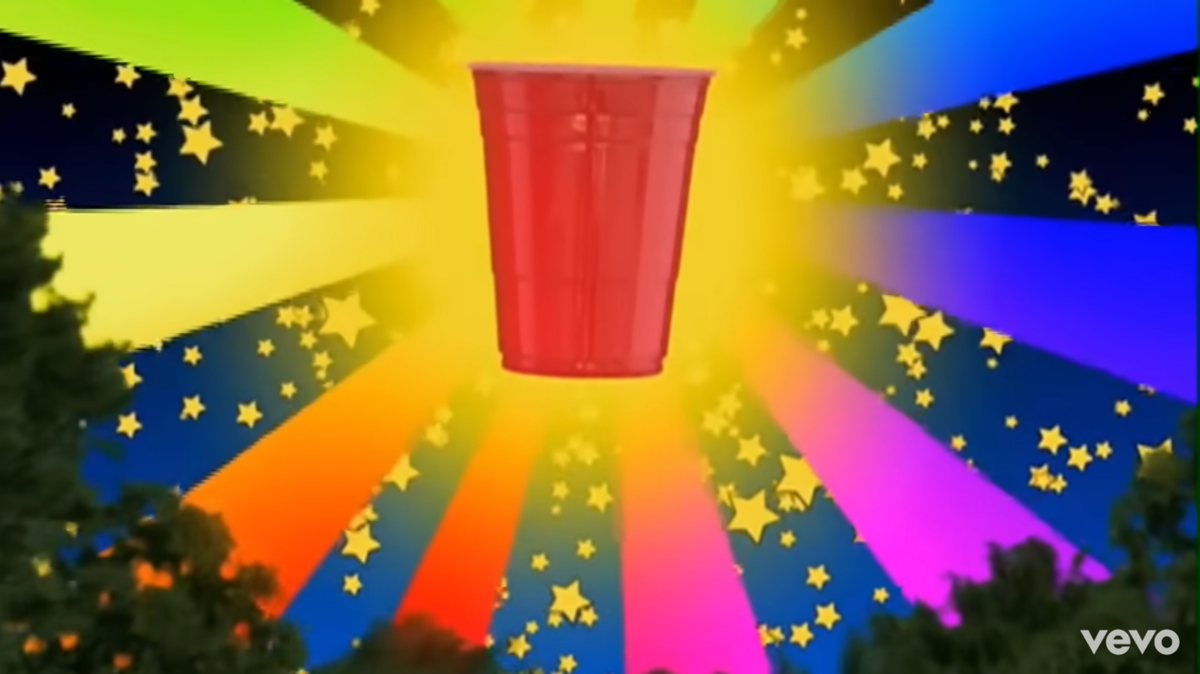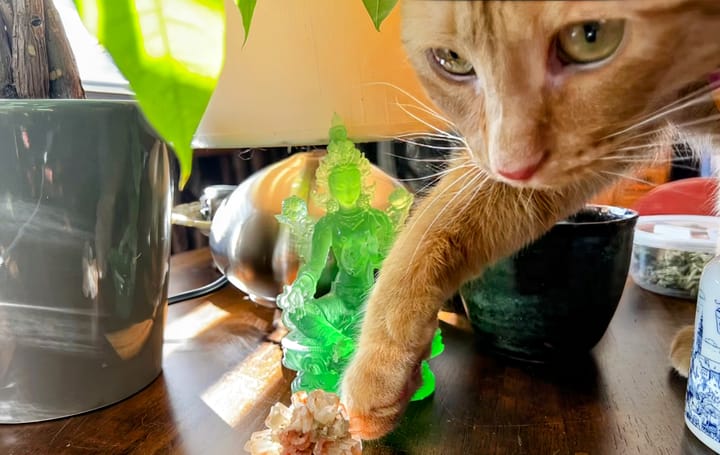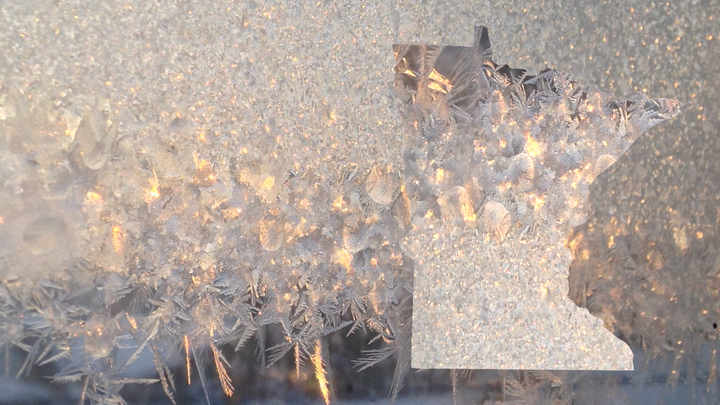Imagine the late Toby Keith in heaven, singing a Bollywood song to the tune of his guitar, while my late father (grinning from ear to ear) accompanies him on the tabla. Adorable! 🥰 The week after Valentine’s Day, here are some plural ways to stay in love with our dear departed.
Another leisurely longread today, dear friends — I have not yet cracked the puzzle of writing briefly. I eagerly welcome your tips about how to write less, so send me ’em if you got ’em.
- A story about music, grief, and the comforts of being more than just one person
- This week’s plural practices: 3 valentine ideas for the dead
- Links: woolly mammoth, 2 obituaries (both really good), clever dactylic wordplay
❄️ Winter landscape with red Solo cup
My boyfriend and I had just got back from our first visit to the old Bell Museum when my phone buzzed in my pocket. It was December 29, 2011, the day after my 31st birthday. My sister was calling to tell me that my father was in the hospital, and might not survive the night.
At the time, the Bell was the old-fashioned kind of natural-history pageant where bright-eyed taxidermies strike dramatic animal poses against oil-painted backdrops. My boyfriend and I had both loved it, in part because we’d discovered there my boyfriend’s wildlife doppelgänger (Lontra canadensis, the river otter). But some superstitious young parts of me, still prone to mistake correlation for cause, blamed our visit to the Bell for all the grief that followed, and felt a sort of horror about the place ever after. We never went back.
A decade later the museum moved its taxidermies into a beautiful new building, not far from where my then-boyfriend and I now live in married contentment. When we drive by the new Bell these days, my young parts heave a little sigh of relief. It is consoling for them to know that the cursed old museum will never again be part of a sequence of events in which somebody’s father ends up dying.
By ten the next morning, Eastern time, I was driving a rental car from the Allentown airport to the Reading hospital, feeling as small and scared as I ever had under the dull white winter skies of the place where I was born. Dread overwhelmed me: father in the ICU or already dead, mother overcome with grief, little sister in need of comfort, brother far away, and everyone looking to me, insanely, as though I would somehow know what to do.
Back then, years before I would meet my inner family, I had no way of understanding what was going on within myself.
- I couldn’t thank capable young Johnny for booking the flight, packing the suitcase, renting the car, and driving it at a prudent four miles per hour over the limit.
- Nor could I comfort the the poor little Mouse, who was writhing in shameful agony in the pit of my stomach — certain, poor creature, my innocent father had been stricken down by a vengeful God to punish him for all my awful sins.
At the time I assumed, as singular people often do, that I was probably just going insane.
My anxiety intensified as the murmuring grown-ups of the underpowered Allentown public radio station dissolved into static. Being alone with my thoughts and feelings seemed highly unwise in those circumstances, so I jabbed at the seek button on the radio with growing panic. Hollow Christian rock, cruel shock-jockery, yammering ads — every new sonic assault made me feel smaller, crazier, more inadequate to the incomprehensible task before me.
The words “God help me!” tumbled out of my mouth — and before I could scold myself for bothering my Higher Power with such a frivolous prayer, the very next radio station, coming in strong and clear, was playing “Red Solo Cup” by Toby Keith.
🍻 The best frat-house party banger to lose a parent to
That song might sound especially familiar at present; it was the background music for many TV and radio stories about Toby Keith’s untimely death, this February 5, at just 62 years old. This deepest part of winter, between the new year and the spring, seems to be a time when lots of people die — including, six weeks after my visit to the Bell Museum twelve years ago, my father.
- Toby Keith’s legacy is complicated, as the obituaries have remarked. He was remarkable for blunt-nosed proto-MAGA jingoism in the wake of September 11, but he had little patience for queer-bashing, xenophobia, and culture-war bully-bait overall. I learned more about him the week after he died than I’d ever thought to wonder about him before. He clearly loved beer, singing, and inexpensive conviviality.
- Ashvin Jayantilal Chudgar, who was 72, died twelve years ago this month as well — a decade less untimely, but more suddenly. He did not like Toby Keith particularly or country music generally, and I don’t think he ever went to a kegger in his life. He only drank with company, which we had seldom; but when he did drink a beer or a little glass of blended scotch on the rocks when people were over, he became jolly and gregarious and laughed uproariously. Alcohol agreed with him; it let him proceed to party.
Beyond their mutual sociability, the strongest link between my father and Toby Keith is the warm good cheer I feel in my heart whenever I hear that wonderful song.
That first time I heard it, in the rental car on my way to the hospital, my whole inner world fell silent just to listen. I was listening to a lot of country radio in those days, so the high-gloss twang felt familiar and comfortable. And the words, at once so goofy and so elegant — addressing the cup, Toby says,
I háve to admít that the ládies get smítten
Admíring how shárply my fírst name is wrítten
On yóu with a Shárpie, when I get to hittin’
On thém (to hélp me get
Lúcky).
— melted my fear-tightened face into a loopy grin. If I’d known to pay attention, I could have felt Johnny relaxing our white-knuckled grip on the steering wheel as the music soothed Mouse’s pain in our belly and Buddy’s shoulders squared. At the time, I only knew the song had quickly, thoroughly cheered me up — and not just because it is a song precision-engineered for maximum cheer.
More profoundly, the me it had cheered up, the version of myself who just freaking loved this goofy country song, was a strong and capable adult, not small and scared at all. He was sober in A.A.; he had a sponsor and home group, and he sponsored other men. He had good friends, a good job, even a long-term boyfriend. He drove a rusty 1994 Toyota pickup with the windows down all summer long. He lived in Minnesota, his home; and now he was a being a good son, flying back to a place he’d long since outgrown to take care of his family, who needed him.
At the hospital later, after my mother and I had made the necessary decisions, I called one of my A.A. buddies to tell him why I wouldn’t be at the meeting that night.
“So they’re going to do the surgery,” I concluded, “but it’s 50-50 that he survives. And even if he does, there’s no telling how long he might be in the ICU. So I don’t know when I’ll be able to get back to Minnesota.”
“That sucks, man,” my buddy said sympathetically. Then he added, in a cheerful A.A. fashion: “Guess it’s time put your big-boy pants on.”
It was a figure of speech, but I looked down at my legs automatically. I was wearing brown corduroy Levis, clean and neat, which fit my grown-man’s legs well under a somber black wool overcoat. In my mind’s ear, Toby Keith was still slurring words of good cheer like a beery guardian angel: You’re more than just plastic. You’re more than amazing, you’re more than fantastic! God, I loved that song.
“Already have ’em on,” I replied, grinning.
🎶 You are the fruit to my loom
To my great good fortune, the country-music station in Reading played “Red Solo Cup” approximately every five minutes that winter. My father survived the surgery on New Year’s Day, only to languish in the ICU without any end in sight. I had gone back to Minnesota and my job — I had classes to teach — once it became clear that nothing more could be done until he got better or died. He did not get better, but he did not get worse, so his death came as another shock. In mid-February, when I flew back for his cremation and memorial service, the same song was still playing just as often, or at least so I remember it.
I never, ever got tired of hearing it. I still haven’t, if you can believe it. To this day, I insist on including it on many of the seasonal playlists my husband and listen to after work. (He says, tactfully, that he’s not tired of it either.)
My fondness for “Red Solo Cup” really seems to defy the laws of association that cursed the old Bell Museum in my imagination. Reminders of a bad time end up as bad memories, don’t they? The cologne I happened to be wearing that winter, for example, got so thoroughly skunked by its association with my father’s death that I feel queasy even remembering what it smelled like. You’d think the song that imprinted itself on my imagination during those same awful days in Pennsylvania would be just as intolerable.
But instead, no matter how many times I hear it, the song makes me remember my father with happy love — not as he was during those horrible last months in the ICU, but as he was when he was most himself:
- taking a macro photograph of the center of a single flower,
- falling softly to sleep with the cat on the sofa,
- humming as he cooked his own improvised curries,
- making faces at babies so they would laugh,
- reading little me the funnies on Sunday mornings.
When Toby Keith passed earlier this month, just a few day’s before the anniversary of my father’s death, the intense affection I felt for the man surprised me. I only really knew him from that one song; I was hardly a fan. Yet there it was: a goofy grin, happy feelings, wistful love. I felt about Toby Keith the way Toby Keith felt about his friend the red Solo cup.
After much internal conversation, my parts and I have come to a surprising conclusion. The person who loved “Red Solo Cup,” the grown man who got through his father’s final illness and death with dignity and aplomb, was a marvelous spontaneous collaboration among the very best qualities of us all: Digby’s daring, the Professor’s smarts, Tony’s confidence, Johnny’s competence, the Badger’s charm, the Mouse’s humility, and Flora’s divine attention to beauty glittering above us all. Years ago, I had no way to understand myself with such precision. All I knew was that the song made me feel grown-up, capable, and sane enough to survive whatever was to come. And that I did.
Valentine ideas for your dear departed

Many people around the world grow up with beautiful rituals for maintaining a loving relationship with those we’ve lost, like burning a Yahrzeit candle or leaving offerings at graves, but I wasn’t one of them. If they had such rituals, my Catholic mother and Hindu father did not pass them along to me, and I never sought out or invented my own. I thought I did not need them. But this Year of Living Plurally has made me aware of the parts of myself who miss my father very much — and my grandparents, and friends I’ve lost, and beloved elders I never got to meet.
So when the Badger suggested the idea of making a little valentine for Toby Keith, the rest of us agreed — even Johnny, who said we could count it as work if we wrote a newsletter about it and logged the time. The result is above.
Therefore, friends, here are some plural practices to try for showing your love to your dear and departed. You could have done any of these practices on Valentine’s Day, if I’d sent this newsletter earlier; sorry! But you can just as well make a valentine on the anniversary of the person’s death, a meaningful date on whatever calendar you like, or any random day, like today.
1. 💌 ✍️ Write them a love letter
Parts of you who never got to express all their love for the person you’ve lost will deeply appreciate the opportunity to write down what they wanted to say. Because such parts are often very young, they often find it possible to believe that writing to the person actually reaches the person, which you may or may not believe also. (I am agnostic on the question myself.) This is not a new or particularly interesting idea, but it makes a lot of sense to me, and I have done it.
- ✨ Fancy: Special stationery, your best handwriting, perfume, etc.
- 📧 Plain: Post-It notes work perfectly well for brief love notes. So do emails! (Tip: if have a Gmail account, you can make a special-purpose email address after a plus sign, like so:
yourgmail+othernameat gmail dot com. Gmail will send it to your regular inbox, and you can label it according to who it’s for.) - 🔥🗄️ Sent or kept: You can send your letter along it in some way, perhaps by burning it or burying it in a special way. You can also tuck it away for yourself to read later on.
2. 🌷💧 Grow them a special flower
This my husband’s beautiful botanical practice for the dead, which my he has agreed to let me share with you. His father died when he was just 14, and nobody taught him how to grieve at the time. So the next time he lost someone he loved very much, his beloved cat Alex, my husband quietly invented his own private way to grieve.
- Start winter-flowering bulbs, like paperwhites, amaryllis, or hyacinths. You can get the bulbs very cheaply at a nursery or a hardware store, or online, then start them in a pot of dirt or even just in water. Here’s an article about how to do it.
- Have your grief spend time with the plant as it grows. For best results, you’ll want to be able to see the plant grow all the way from the bulb, or from little tiny green shoots, to the beautiful flowers. Depending on the plant you’re growing, this will take weeks or even a months, and it impossible to predict exactly. That’s as it should be. Following the plant’s lead is important here; you don’t know how long the practice is supposed to take, so you’re trusting the plant’s own timing. When it blossoms, imagine the flowers are showing the one you have lost how much you love them.
- Once the flowers have faded, bid them farewell. Winter-forced flowers don’t last very long — a week and change, at most. Watching them wither is part of the practice, too; it’s a way of being with your own grief. Cut down the flower-stalks, which you may want to do in a solemn way, while leaving the plant’s green leaves to continue growing for a while. This is a way of reassuring the departed that you are carefully, lovingly, continuing to live.
Some plants, like amaryllises, will remain very happy houseplants after the flower is gone. You can keep an amaryllis alive that way for years, although it probably won’t bloom again unless you take special steps. Some bulbs can be planted outside, but most forced bulbs will go into the compost after the foliage dies.
If you want any advice on this practice, just hit reply and I will ask my husband for you. He’s an official master gardener now.
3. ✂️🖍️ Make them a valentine by hand
If any part of you is inclined toward arts and crafts, this is a simple and lovely way to tell your departed you love them. You can make your valentine out of whatever supplies you have handy, in whatever form you find most congenial: for example,
- origami
- paper and glue (collage, découpage, quilling, etc.)
- tattooing
- amigurumi (crocheting tiny creatures out of yarn)
- calligraphy
- doodling on scrap paper
The valentine the Badger made for our father and Toby Keith was made in Google Slides, the medium we find most fluid these days.
That’s all for this week friends! Some interesting links follow. And a belated happy Valentine’s day from all of me and my dear departed to all of you and yours! Write back any time: we all love to hear from you.
🔗 Linkies
🦦🦣🏛️ The Bell Museum
It’s really wonderful! There is a life-sized woolly mammoth there, posing imposingly in a sleek cantilevered box! It’s not actually haunted or cursed.
🪦 In memory of Ashvin Jayantilal Chudgar
Here is the obituary I wrote for my father, which I am shamelessly republishing without permission from the ghoulish obituary racketeers who run legacy dot com.
🔴🍺 Red Solo Cup
The phenomenon
This obituary of Robert Hulseman, who died in December of 2016, offers an excellent introduction to the American icon that is the red Solo cup. (He invented the disposable coffee-cup top we all use today, too, with the drinky hole.) According to his son, the inventor died unwilling to acknowledge that our strange culture had adopted his practical stackable invention not as a wholesome family soft-drink receptacle, as he had intended, but as the very emblem of vulgar frat-boy libertinism. “It was for families,” he was said to insist.
The song

Lyrics
Written by the Warren brothers, Brett and Brad, and the Beavers brothers, Brett and Jim, recorded by Toby Keith, and released October 10, 2011.
I.
Now, a réd Solo cúp is the bést recéptacle
For bárbecues, taílgates, faírs, and féstivals;
And yoú, sir, do nót have a paír of tésticles
If yoú prefer drínking
From gláss.
(Meter continues in the same way)
A red Solo cup is cheap and disposable;
And in fourteen years they are decomposable,
And unlike my home, they are not forecloseable
(Freddie Mac can kiss
My ass).
CHORUS
(Dum-dum-dum,)
Red Solo cup:
I fill you up!
Let’s have a party?
Let’s have a party!
(I love you,)
Red Solo cup,
I lift you up:
Proceed to party?
Proceed to party!
II.
Now, I really love how you’re easy to stack,
But I really hate how you’re easy to crack —
’Cause when beer runs down the front of my back,
Well that, my friends, is quite
Yucky.
But I have to admit that the ladies get smitten
Admiring how sharply my first name is written
On you with a Sharpie when I get to hittin’
On them (to help me get
Lucky).
CHORUS
III.
Now, I’ve seen you in blue, and I’ve seen you in yellow,
But only you, Red, will do for this fellow,
’Cause you are the Abbott to my Costello,
And you are the fruit to my
Loom.
Red solo cup, you’re more than just plastic —
You’re more than amazing, you’re more than fantastic!
And believe me that I’m not the least bit sarcastic
When I look at you
And say —
(Speaking, con passione) Red Solo cup, you’re not just a cup. You’re my — friend. Friend! Lifelong. Thank you … for being my friend.
CHORUS
Video
This video is honestly not super-safe for work, in that it’s got a lot of young white women in bikinis being leered at by white men of all ages and a middle-aged white Toby Keith. I like it, though.




